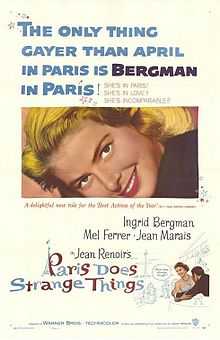Elena and Her Men
| Elena and Her Men | |
|---|---|
 Theatrical release poster | |
| Directed by | Jean Renoir |
| Produced by | Louis Wipf |
| Written by |
Jean Serge Jean Renoir |
| Starring |
Ingrid Bergman Jean Marais Mel Ferrer Jean Richard |
| Music by | Joseph Kosma |
| Cinematography | Claude Renoir |
| Edited by | Borys Lewin |
| Distributed by | Warner Bros. Pictures |
Release dates |
12 September 1956 (France) 31 December 1956 (Italy) March 29, 1957 (U.S.) 28 November 1958 (Germany) |
Running time | 95 minutes |
| Country | Italy/France |
| Language | French |
Elena and Her Men is a 1956 film directed by Jean Renoir and starring Ingrid Bergman and Jean Marais. The film's original French title was Elena et les Hommes and in English-speaking countries, the title was Paris Does Strange Things. A restored copy has been released in the 21st century.
Plot
Elena is a beautiful but penniless Polish princess in fin de siècle Paris, whose gift is to bring luck to the men she loves. At the outset involved with a budding composer, during the newly introduced celebrations of 14 July, she meets the next two men in her life, the charming Count de Chevincourt (Mel Ferrer) and the amorous General Rollan (Jean Marais).
When Rollan, who has political ambitions, is deliberately posted to a remote town, Elena with the help of Chevincourt follows him. His supporters urge him to lead a coup d’état against the young republic. He has based his quarters at a brothel and it is surrounded by plain clothes police. Elena and Chevincourt create a diversion by a long and tender embrace before the crowd, who are won over by this display of love. Rollan disguised as a gypsy escapes to exile.
Cast
- Ingrid Bergman as Princess Elena Sokorowska.
- Jean Marais as General François Rollan.
- Mel Ferrer as Count Henri de Chevincourt.
- Magali Noël as Lolotte, Elena’s maid.
- Juliette Gréco as Miarka, a gypsy singer.
- Dora Doll as Rosa la Rose, madame of the brothel.
Background
This was Bergman's first film after leaving her husband, director Roberto Rossellini. The character of General Rollan was based on the historic General Boulanger. In 1886 Boulanger had much popular support personally despite the French defeat in the Franco-Prussian War, and some supporters urged him to conduct a coup d'état. (He did not.)
Reception
Ingrid Bergman's performance was highly praised. Roger Ebert wrote that she played a Polish princess who could affect the future of France, but he said, that's just what the plot is about.
"The movie is about something else - about Bergman's rare eroticism, and the way her face seems to have an inner light on film. Was there ever a more sensuous actress in the movies? Francois Truffaut, reviewing this film, observed that 'sex is the only focus of attention'."[1]
He says that "Renoir preserves a strong erotic and romantic thread (the love between Bergman and Ferrer) all the way through the movie's farcical elements."[1]
Christopher Faulkner described the film as a farce dealing with many issues and incidents similar to Renoir's well-known Rules of the Game. But he wrote that it is somewhat "cynical," despite its lightness. He says that "the point is made that a woman can only find (provisional) power within representation, on a stage, playing a part. At the end of the film, as coup d’état dissolves into coup de théâtre, the suggestion is that all effective power is actually a function of performance."[2]
References
- ↑ 1.0 1.1 Reviews: Elena and Her Men (1987 revival), Roger Ebert website
- ↑ Christopher Faulkner, Elena and Her Men, Criterion Collection, 2004, accessed 21 June 2014
External links
- Elena and Her Men at the Internet Movie Database
- Elena and Her Men at AllMovie
- Elena and Her Men at the TCM Movie Database
- Christopher Faulkner, "Elena and Her Men", Criterion Collection, 2004